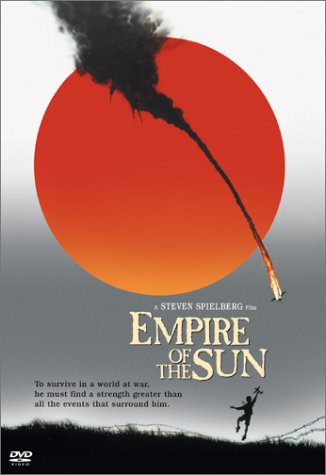
Empire of the Sun (1987)

This adaptation of J.G. Ballard's quasi-autobiographical novel witnesses WWII through a child's eyes, and does so through a visual means more akin to silent than to modern filmmaking. Spielberg's vision is no longer one of innocent wonderment; instead, EMPIRE OF THE SUN concerns the end of innocence--a young boy thrown into adulthood and an entire generation thrown into an atomic age. The film opens just before the Japanese attack on Pearl Harbor in 1941. Jim Graham (Christian Bale) is a nine-year-old English brat who has lived all his life in Shanghai with his aristocratic parents. Although adventurous, he is also wholly dependent on his parents and servants.
Later, as the Japanese conquer Shanghai and the war intensifies, he is separated from his parents and meets Basie (John Malkovich), an opportunistic merchant seaman reminiscent of Dickens's Fagin, who somewhat reluctantly takes Jim under his wing and teaches him the most Darwinian methods of survival--lessons that help Jim endure a lengthy stay in a Japanese prison camp. The most emotionally complex film of Steven Spielberg's career, Empire of the Sun is not a traditional blockbuster. In fact, with its unknown lead, barely known supporting cast and near-plotlessness, it breaks Hollywood's rules. Further, Spielberg has adapted an admired but little-read novel, set it in far-off Shanghai, and made his lead character a Briton who idolizes the Japanese. As Jim, Bale delivers a stunning performance; he appears in virtually every frame and truly seems to grow over the course of the film from a coddled rich child to a calculating, almost feral creature who will ally himself with whoever wields the most power in a given situation.
Working on a grand canvas in the tradition of the David Lean epics, Spielberg includes several of his own distinctive visual epiphanies but the usual sense of wonder threatens to slide into madness. Spielberg also displays a progressive and sophisticated awareness of issues of class and race that may be viewed as an apology for the casual imperialist and racist assumptions of his INDIANA JONES series.
Academy Award Nomination: Best Sound - Robert Knudson, Don Digirolamo, John Boyde, Tony Dawe Best Art Direction-Set Decoration - Norman Reynolds (Art Direction), Harry Cordwell (Set Decoration) Best Cinematography - Allen Daviau Best Costume Design - Bob Ringwood Best Film Editing - Michael Kahn Best Original Score - John T. Williams.
Performer/Character
Christian Bale, Jim Graham
John Malkovich, Basie
Miranda Richardson, Mrs. Victor
Nigel Havers, Dr. Rawlins
Joe Pantoliano,
Frank Demerest, Leslie Phillips
Maxton, Masato Ibu Sgt. Nagata
Emily Richard, Jim's Mother
Rupert Frazer, Jim's Father
Peter Gale, Mr. Victor
Takatoro Kataoka, Kamikaze Boy Pilot
Ben Stiller, Dainty
David Neidorf, Tiptree
Ralph Seymou,r Cohen
Robert Stephens, Mr. Lockwood
J.G. Ballard, Guest at Costume Party
Production Credits
Producers: Kathleen Kennedy, Frank Marshall, Steven Spielberg
Exec. Producer: Robert Shapiro
Assoc. Producer: Chris Kenny
Director: Steven Spielberg
Writer Menno Meyjes (uncredited) Tom Stoppard (based on the novel by J.G. Ballard)
Editor: Michael Kahn
Musical Composer: John Williams
Production Designer:
Special Effects: Ye Mao, Gen Industrial Light & Magic, Antonio Parra, David Watkins
Cinematographer: Allen Daviau (Technicolor)